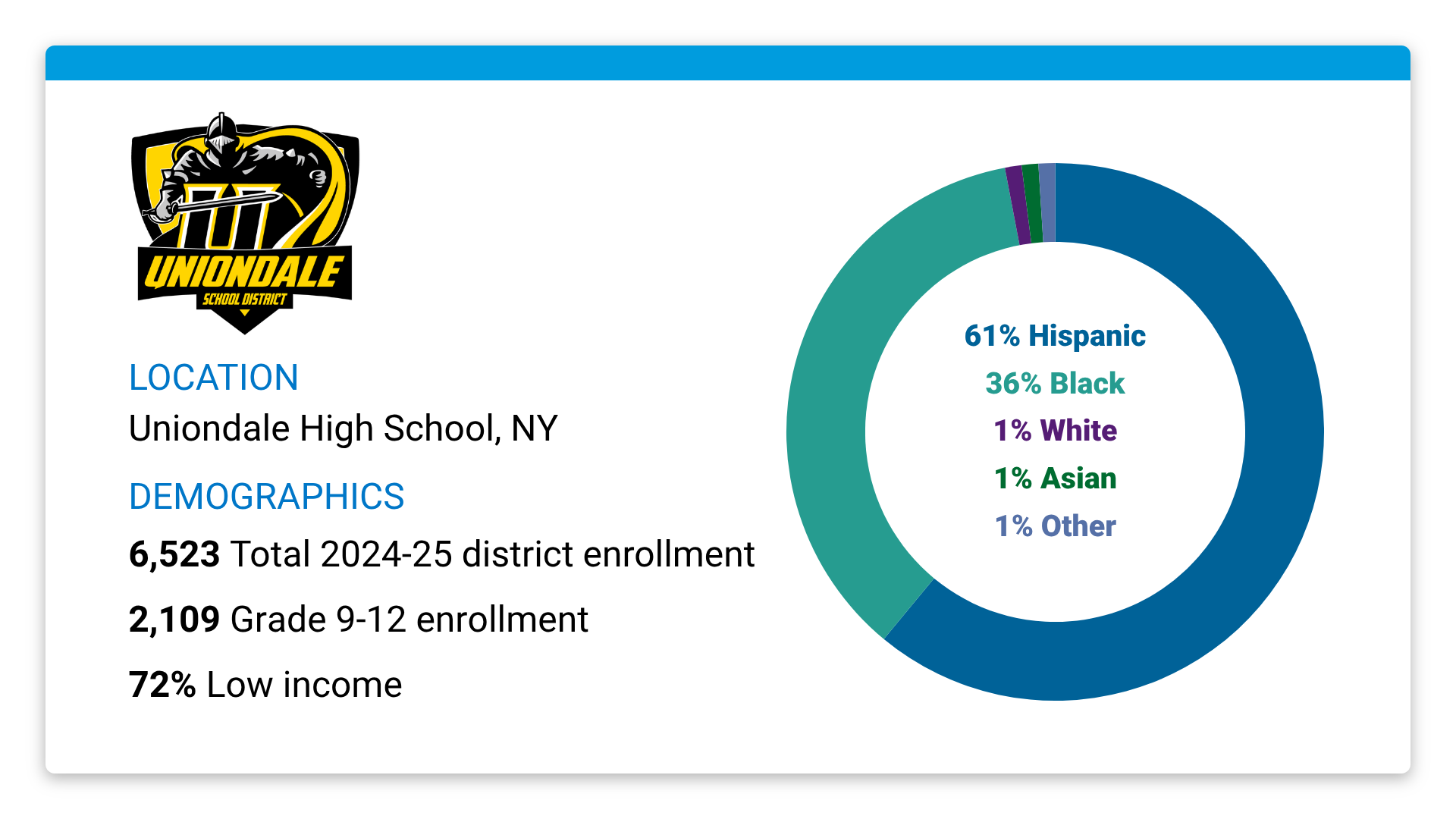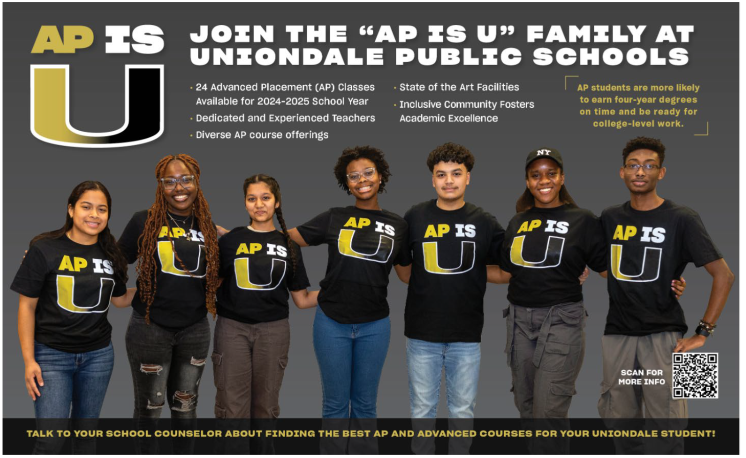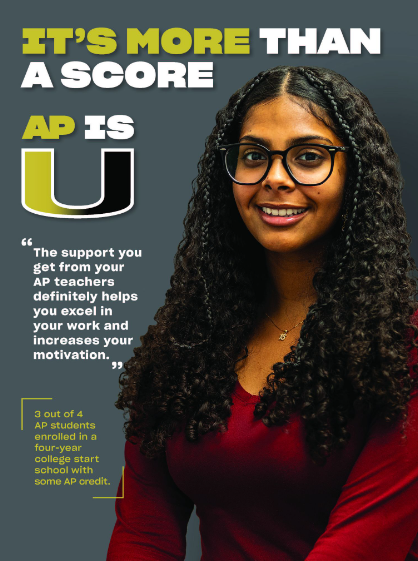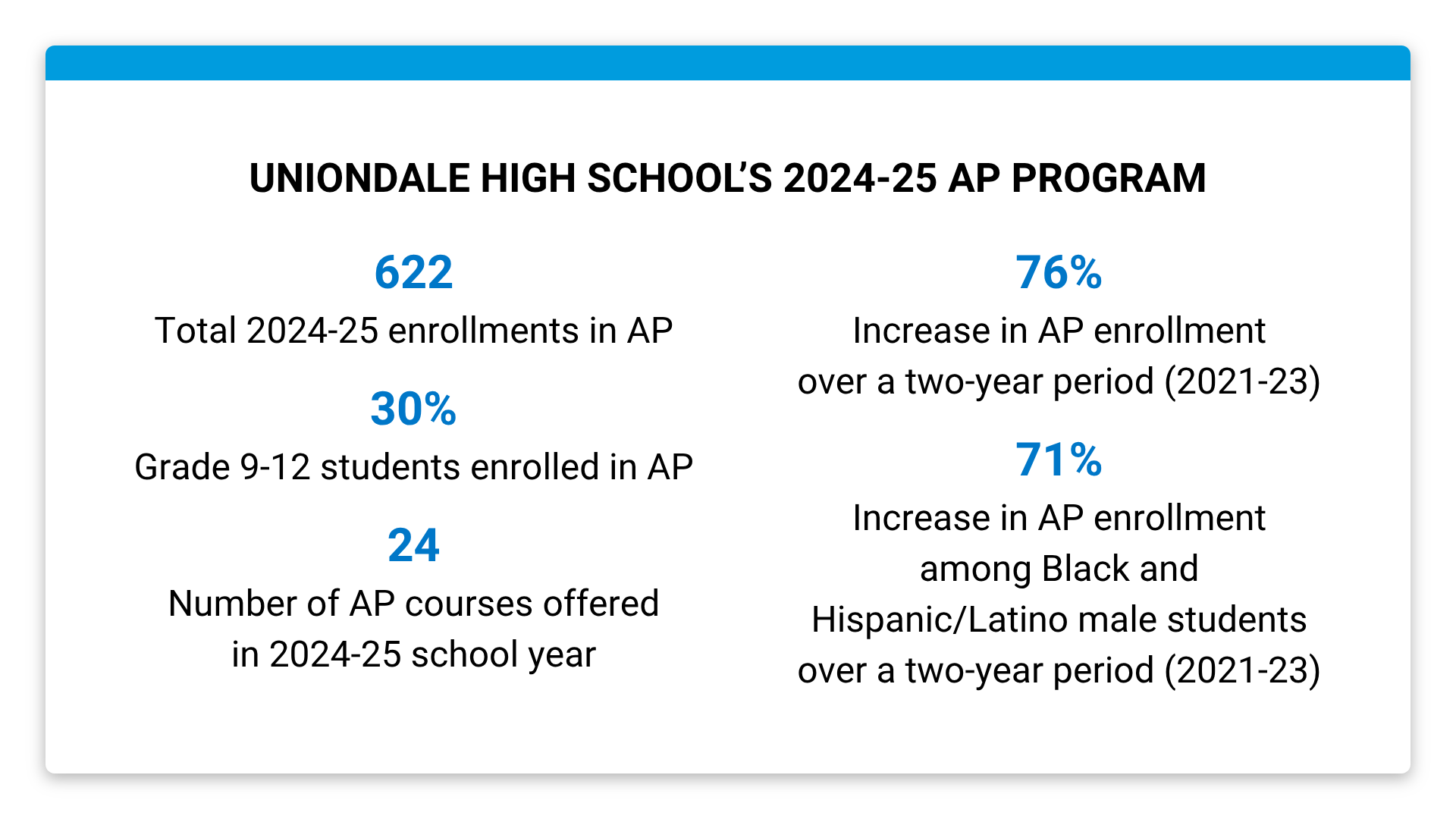Identifying and Addressing a Gender Gap to Build AP Participation
To address a gender gap in Advanced Placement enrollments at Uniondale Union Free School District, we wanted to not only close the divide, but also understand why more boys were not participating. We set aggressive goals to increase participation overall and by Black and Latino/Hispanic males. By making our goals a district priority and making them public, we were better able to garner public support and accountability.
Identifying the Opportunity
Our school community is predominantly made up of students of color, with 97% of the student body being Hispanic/Latino or Black. Additionally, nearly three quarters of our students come from economically disadvantaged backgrounds.
We realized a significant gender imbalance in AP enrollments, with girls making up 70% of our participants and boys only 30%. This meant that many male students who could benefit the most were missing out on the cost savings and college-going mindset realized through AP. Many of these boys weren’t getting enough exposure to the valuable real-world skills AP helps to build, including communication, problem-solving, collaboration, and critical thinking. They were also missing the opportunity to discover potential career paths, which many Uniondale students have found through AP classes.
Since we offer over 20 AP courses, we had capacity and an opportunity to even out the gender distribution. After comparing our AP enrollment against a report from AP Potential™, which provides a roster of students who are ready to take AP, we discovered far more male students could and should be enrolling.
“It [the data] hit me like a bolt of lightning and made me determined to close the gender gap in our AP participation with intentional planning and outreach.”
Monique Darrisaw-Akil, EdD, Superintendent
Turning Opportunity Into Action
First, we wanted to examine why this disparity existed. Both students and parents perceived AP courses as “elitist.” So, we had to change those perceptions. We made conversations about AP part of parent meetings, and we used AP alumni and teachers as ambassadors to answer questions, ease doubts, and build excitement.
We also created a high visibility campaign called “AP is U.” It parallels this year’s systemwide theme “Unlock the Genius in U.” The campaign included newspaper ads, posters, t-shirts, a video, and a webpage. It featured students enrolled in AP classes to put a familiar face on the courses and make them relatable to peers. Through our partnership with Equal Opportunity Schools, we surveyed students, teachers, and counselors and concluded that every student can succeed in AP.
AP classes that include a project component, such as AP Computer Science Principles, English 10: AP Seminar, and AP African American Studies, are popular among students. Students enjoy the collaborative aspect of these courses and hearing their classmates’ differing perspectives. The ability to choose their own study topic gets more students interested in trying AP.
We also discovered that some prerequisites were barriers to access so we eliminated many of those.
To prepare teachers, we made sure to answer their questions, provided opportunities for professional development through participation in AP Summer Institutes, and encouraged them to reach out to peers for advice.
Evaluating the Outcomes
As a certified My Brother’s Keeper Community, we made a commitment to organizing our work around six national milestones that include ensuring that young men of color graduate high school and have a postsecondary plan. Our community set goals around increasing the number of young Black and Latino/Hispanic men who graduate from high school and for improving college and career readiness.
Over a two-year period, we aimed to achieve two main objectives:
We significantly surpassed each goal in just two school years:
|
Students continue to need encouragement. Some need extra support, like an extra study period or peer tutoring. Some first-year students have said, “I only scored a 2 on my exam.” We remind them they were successful in the course and now they are better prepared for a college course. It’s still a success and we make sure they know that.
Above all, we had to remind ourselves to celebrate. It is so easy to think about what didn’t happen that you forget what did happen.
Practical Pointers
- Exude Confidence: Adopt a “you can do it” attitude and commit to changing mindsets.
- Seek Out Influencers: AP alumni can be effective advocates in reaching students in a way that differs from teachers and administrators.
- Partner with Parents: Parents and the home environment are keys to success. Give parents tips like creating a home setting that allows students to focus.
- Remove the Mystery: Communicate and encourage questions to make AP classes an achievement anyone can tackle.
- Cut Through the Noise: Recognize that the individuals you are trying to reach likely experience information overload daily. Remember to clearly and cleverly communicate your message through a variety of channels.
Educator Perspectives
“We developed goals that were embedded in the district priorities focused on increasing AP participation, specifically participation from male students of color. We made it public in order to garner public accountability and support.”—Monique Darrisaw-Akil, EdD, Superintendent
“Students learn many crucial skills in AP like critical thinking, communication, problem solving, time management, teamwork, and adaptability. They learn to advocate for themselves. These skills are necessary in the real world.”—Stacie Reid, EdD, Director of Guidance
"Connect with the entire school community. This can’t be a top-down initiative. It has to be inclusive. Speak to your teachers and counselors because when they’re excited and passionate about something it can build student interest. Have conversations to change student mindsets and behaviors to encourage them to think ‘You can do this.’ Make sure there is support for students so they succeed, perhaps by providing peer mentoring or tutoring.”—Stacie Reid, EdD, Director of Guidance
“Celebrate. It is so easy to think about what didn’t happen that you forget what did happen.”—David Hollander, Director of Social Studies



